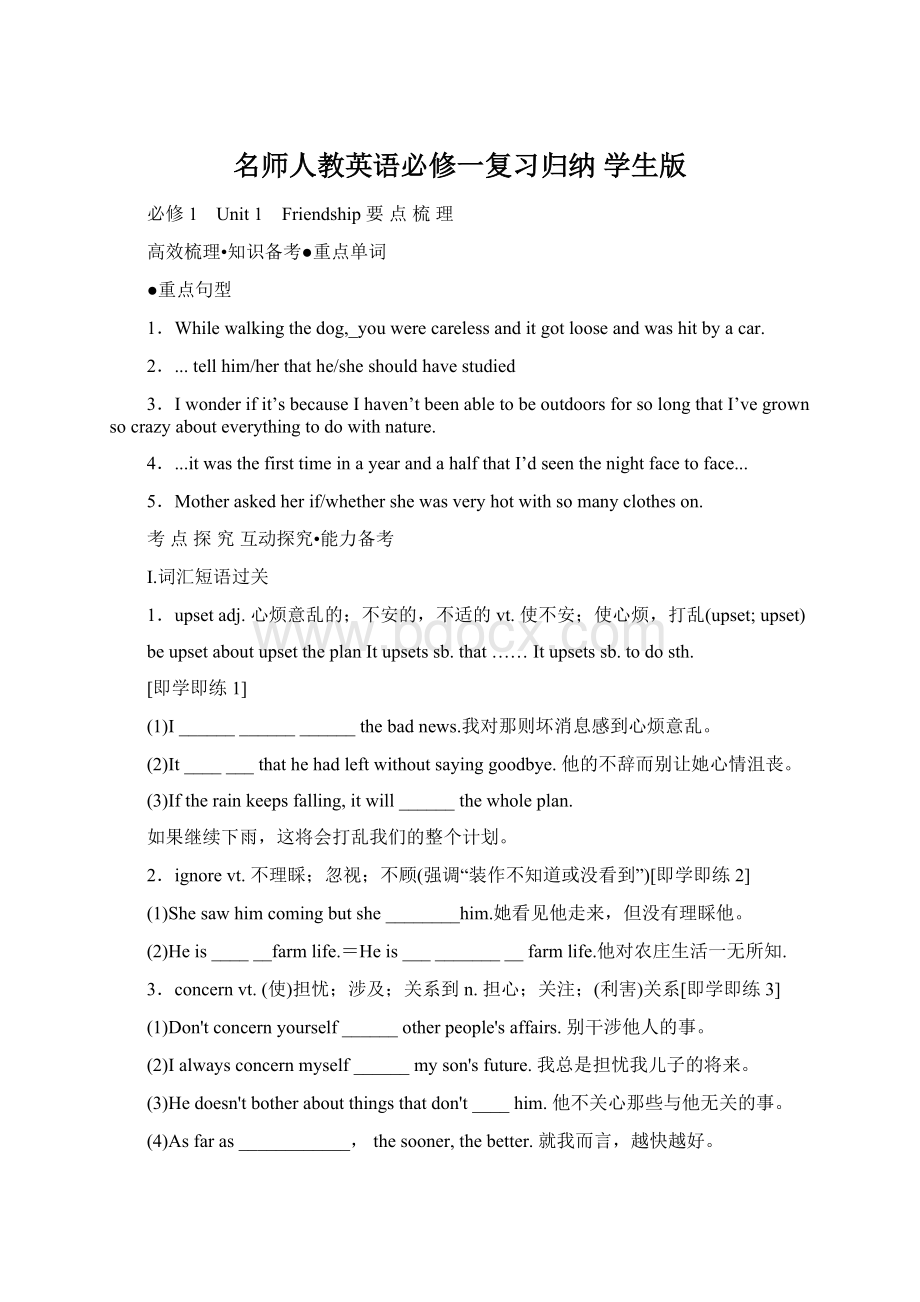名师人教英语必修一复习归纳 学生版Word文档格式.docx
《名师人教英语必修一复习归纳 学生版Word文档格式.docx》由会员分享,可在线阅读,更多相关《名师人教英语必修一复习归纳 学生版Word文档格式.docx(29页珍藏版)》请在冰豆网上搜索。

(2)Heis______farmlife.=Heis____________farmlife.他对农庄生活一无所知.
3.concernvt.(使)担忧;
涉及;
关系到n.担心;
关注;
(利害)关系[即学即练3]
(1)Don'
tconcernyourself______otherpeople'
saffairs.别干涉他人的事。
(2)Ialwaysconcernmyself______myson'
sfuture.我总是担忧我儿子的将来。
(3)Hedoesn'
tbotheraboutthingsthatdon'
t____him.他不关心那些与他无关的事。
(4)Asfaras____________,thesooner,thebetter.就我而言,越快越好。
(5)_____________yourletter,I'
mpleasedtoinformyouofwhatyouareinterestedin.关于你的信,我乐于奉告你所感兴趣的东西。
4.seriesn.系列;
连续aseriesof 一连串的;
一系列的[即学即练4]
(1)Thenbegan_______________wetdaysthatspoiledourvacation.
之后就是一连串的下雨天,把我们的假期弄得一团糟。
(2)There______aseriesofcaraccidentsatthecrossingthismorning.
今天早晨在十字路口发生了一连串的交通事故。
5.settlevi.安家;
定居;
停留vt.使定居;
安排;
解决[即学即练5]
(1)She__________thecityafterherfather'
sdeath.父亲去世后她就在城市里定居了。
(2)They__________________inafriendlyway.他们友好地解决了他们的争端。
(3)Let'
s__________________thework.我们开始工作。
6.suffervt.&
vi.遭受;
忍受;
经历[即学即练6]
(1)They___________agreatlossintheearthquake.在地震中他们蒙受了巨大损失。
(2)I'
ll_________thisrudenessnolonger.我再也不能忍受这种粗鲁了。
(3)He'
s____________abadcold.他正患重感冒。
(4)Warscaused___________tothiscountry.战争给这个国家带来了苦难。
7.recovervi.&
vt.痊愈;
恢复;
重新获得[即学即练7]
(1)LiuXiangisstill________________hisoperation.手术后,刘翔仍在恢复之中。
(2)Heseemedupsetbutquickly_____________.他显得心烦意乱,但很快静下心来。
(3)Hehas______aslow____________thestrain.他慢慢从紧张中恢复过来。
8.addup合计[即学即练8]
(1)Canyou______thesefigures______?
你能把这些数字加起来吗?
(2)Allthesefigures_______________5000.所有这些数字加起来共计5000。
(3)He______somesugar______thecoffee.他给咖啡里加了些糖。
(4)Thebadweather____________ourdifficulty.坏天气增加了我们的困难。
(5)He______thathewassatisfiedwiththetalk.他补充说他对会谈很满意。
9.gothrough=experience经历,经受=examinecarefully仔细检查=lookthrough浏览,翻阅=pass(through)通过,经过=beusedup用完
[即学即练9] 写出下列各句中gothrough的意思。
(1)Wewentthroughhardshipswhileworkingonthisproject.________________
(2)Theteacherhasgonethroughallthepapersofthestudents.____________
(3)Hehasthehabitofgoingthroughmorningpapersaftergettingup._____________
(4)Ittookusthreedaystogothroughtheforest.____________
(5)I'
vegonethroughmyink.______________
10.setdown
(1)=writedown写下,记下
(2)=putdown放下,搁下
(3)=stopandallowsb.togetoff让某人下车
(4)=explainordescribetooneselfas解释为,认为(与as连用)[即学即练10]
(1)Whydon'
tyou______yourideas______onpaper?
为什么你不把你的想法写在纸上呢?
(2)______thatheavybag______tohavearest.把那沉重的袋子放下,休息一会儿。
(3)Please______me______atthenextcorner.请在下一个拐角处让我下车。
(4)I______theman______asasalesman.我认为那个人是位售货员。
拓展:
set有关的短语
11.inorderto为了……
(1)inorderto
(2)否定结构:
(3)前后两部分主语一致时,
[即学即练11]翻译句子。
(1)为了看清楚,我戴上了眼镜。
_____________________________________
(2)为了不丢掉工作,她向老板说了谎。
_______________________________
12.getalong/onwith与……相处
getalong/onwell/nicelywith....进展(谈及或问及工作情况)[即学即练12]
(1)Howisthework____________?
工作进展如何?
(2)Howareyou__________________yourstudies?
你功课学得怎样?
(3)Selfishmenarehardto__________________.自私的人很难相处。
Ⅱ.重点句型详解
1.Whilewalkingthedog,youwerecarelessanditgotlooseandwashitbyacar.
①When(Iwas)inJapan,Itookmanybeautifulpictures
b.Helooksasif(hewere)drunk.。
c.Iwon'
tgounless(I'
m)invited.
d.Fillintheblankswiththegivenwords;
changetheformwhere(itis)necessary.
[即境活用1] Whenfirst______tothemarket,theseproductsenjoyedgreatsuccess.
A.introducing B.IntroducedC.introduceD.beingintroduced
2....tellhim/herthathe/sheshouldhavestudied
shouldhavedone结构表示过去应该做某事而事实上没有做;
而shouldn'
thavedone则表示过去本不该做某事而实际上却做了,两者皆含有“责备”的口吻。
①Youshouldhavefinishedyourhomeworkyesterday.
②Youshouldn'
thavetoldhimaboutit.你
其他“情态动词+have+done”结构:
(1)musthavedone
(2)can'
t/couldn'
thavedone(3)needn'
thavedone
(4)ought(not)tohavedone=should(not)havedone
(5)might/mayhavedone(6)couldhavedone
(7)wouldhavedone[即境活用2]
Oh,I'
mnotfeelingwellinthestomach.I______somuchfriedchickenjustnow.
A.shouldn'
teatB.mustn'
thaveeatenC.shouldn'
thaveeatenD.mustn'
teat
3....itwasthefirsttimeinayearandahalfthatI'
dseenthenightfacetoface...……
Itis/wasthefirsttime(that)...这是一个固定句式,
①Thisisthefourthtimeshe'
srungyouinaweek.。
②这是他第二次单独跟她外出。
③那将是我第二次获得该奖。
(2)thefirsttime我第一次见到她时,心脏都停止了跳动。
(3)forthefirsttime例题:
.他第一次被骗了。
[即境活用3]
—Haveyoueverbeenherebefore?
—No.ThisisthefirsttimethatI______totheGreatWall.
A.ComesB.havebeenC.cameD.hadcome
4.Motheraskedherif/whethershewasveryhotwithsomanyclotheson.
“with+n.+形容词/副词/介词短语/分词/动词不定式”这种结构在句中经常做状语,表示原因、方式或伴随状态。
①Helayonhisback,withhiseyeslookingupintothesky.他躺着,眼瞅着天空。
②Withhishomeworkdone,hewentouttoplay.完成作业,他就出去玩了。
③有导游带路,我们将不费力地找到他家。
⑤Heisusedtosleepingwiththewindowsopen.他已经习惯了开着窗户睡觉。
⑥Heoftensleepswiththelighton.他经常开着灯睡觉。
[即境活用4]___fiveminutes____beforethelastbusleft,wearrivedatthestation.
A.Therewere;
goB.With;
togoC.Itwas;
leftD.Ithad;
left
易错点拨—自我完善•误区备考
1.calm/quiet/still/silent[应用1]
(1)Askthechildrentomakelessnoiseandkeep______.
(2)Althoughshewasfrightened,sheansweredina______voice.
(3)Johnisa______,thoughtfulboy.
(4)Pleasestand______whileIamreadytotakethephotograph.
2.power/right/strength/force/energy[应用2]
(1)You’llneedtoapplyallyour______tothisjob.
(2)Youhaveno______totreatmelikethis.(3)Congresshas______todeclarewar.
(4)The______oftheexplosionbrokeallthewindows.
(5)Awashingmachineisasaveroftimeand________.
3.joinin/takepartin/attend/join[应用3]
(1)Wouldyou______us______thegame?
(2)Allthestudents___________________schoolactivities.
(3)Therearemanypeople______themeeting.(4)Mybrother_____thearmylastyear.
4.连词+doing/done[应用4]
(1)Though______money,hisparentsmanagedtosendhimtouniversity.
A.LackedB.lackingofC.lackingD.lackedin
(2)While______thebookonthetopshelf,youneedtobeverycareful.
A.toreachB.ReachingC.reachD.arereaching
(3)Generallyspeaking,______accordingtothedirections,thedrughasnosideeffect.
A.whentakingB.whentakenC.whentotakeD.whentobetaken
(4)Theresearchissodesignedthatonce______nothingcanbedonetochangeit.
A.beginsB.havingbegunC.BeginningD.begun
高效作业自我测评•技能备考
Ⅰ.单词拼写
1.Thesnowisvery______(疏松)andthereisalotofairinit.
2.Hislifeis_____(完全地)givenuptowork.3.The_______(幕布)risesandtheplaybegins.4.That'
s__________(正是)whatIexpected.
5.Tosendmetocollege,myparents_________(受苦)alot.
6.Ourworkmatehasbeenindanger.We'
reallc_____________abouthishealth.
7.TheycomefromGermany.TheyareG____________.
8.Onhotsummernights,peopleliketosito_____,chattingandenjoyingthecoolair.
9.I'
mg________________foryourhelp.
10.Theirageisfrom13to19.Theyarecalledt_________________.
必修1 Unit2 Englisharoundtheworld
1.Today,morepeoplespeakEnglishastheirfirst,secondoraforeignlanguagethaneverbefore.
2.NativeEnglishspeakerscanunderstandeachothereveniftheydon’tspeakthesamekindofEnglish.
3.Believeitornot,_thereisnosuchthingasstandardEnglish.
信不信由你,(世界上)没有什么标准英语。
1.nativeadj.本地的,出生地的;
天赋的n.本地人;
出生于某国的人
[即学即练1]
(1)Chinaisour____________,andChineseisour____________.
中国是我们的祖国,汉语是我们的母语。
(2)Thetiger__________________India.这种虎产于印度。
(3)Heis__________________Beijing.他是北京人。
2.basevt.以……为根据n.基部;
基地;
基础[即学即练2]
1.Whatareyou_____thistheory____?
你这种理论的根据是什么?
(2)Theydecidedto______thenewcompany______NewYork.
他们决定将新成立的公司总部设在纽约。
3)Thetownisanideal______fortouringthearea.这个镇子是在这一地区旅游观光的理想地点。
3.commandn.[C]命令;
指令[U]掌握vt.&
vi.命令;
指挥;
支配[即学即练3]
(1)Thearmyis________________________________.军队由国王直接统率。
(2)She______________________________theGermanlanguage.她精通德语。
(3)Hecommandedus______________immediately.
=Hecommandedthatwe____________immediately.他命令我们马上离开。
4.requestn.&
vt.请求,要求[即学即练4]
(1)Thesematerialsare____________________.急需这些材料。
(2)She________________________somewater.她请求给点水。
(3)MayI______yourattention?
请你们注意一下好吗?
(4)Irequest(ofhim)thathe____________.我要求他离开。
(5)Visitorsarerequested__________________thepaintings.游客不许动油画。
5.recognizevt.辨认出;
承认recognitionn.认出,识别[即学即练5]
recognizableadj.recognizedadj.recognizesb./sth.by/from./
recognizesb./sth.as/tobe...…/It’srecognizedthat...outof/beyondrecognition
(1)I_______Mary___hervoiceonthephone.我在电话中根据声音辨认出是玛丽。
(2)Lawrence’snovel______eventually___________________/____________aworkofgenius.劳伦斯的小说最后被认为是天才的作品。
(3)__________________________environmentpollutionhasbecomeoneofthemostseriousproblems.人们一致认为环境污染已经成了最严重的问题之一。
6.becauseo